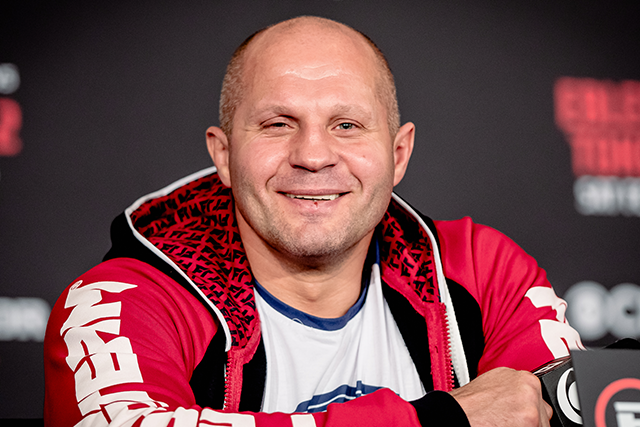Fistic Medicine: Insuring Fighters
Matt Pitt May 9, 2011

Zuffa's insurance announcement was a landmark moment for the
sport. | Photo: Stephen Albanese/Tailstar.com
Health insurers do their thinking with a calculator, summing risks and costs. Until UFC Chairman and CEO Lorenzo Fertitta’s breathtaking announcement of the UFC’s commitment to provide training-related health insurance to its fighters, the math has been solidly against mixed martial artists. The many positive attributes fighters have as potential insures -- young, generally male, fit -- have been wholly overshadowed by their massive career-dependent health liability. Fighting for a living is a health insurance deal breaker.
Beyond the risk of their job, several factors make MMA fighters almost uniquely disadvantaged in finding health insurance in America.
Advertisement
Is the risk of paralysis one in 100,000 or one in 160,000? Is there a 0.03 per annum risk of biceps tendon rupture or a 0.11 percent risk? Does a fighter go to the emergency room five times in a career or 20? For firefighters -- another profession with high work-related injury risk -- these numbers are known. For mixed martial artists, they are not; that uncertainty represents hundreds of thousands of dollars’ worth of exposure for an insurer.
MMA fighters are independent contractors -- not employees -- and
are thus unable to purchase insurance as a group. Individually
purchased insurance is substantially more expensive than group
insurance. Widely disparate pay grades among fighters insure
divergent interests and needs regarding insurance coverage and make
collective labor action unlikely.
Neither this column nor this website has hesitated to speak critically of the actions of the world’s preeminent MMA organization, but the UFC’s actions on Monday deserve the highest praise. Without any apparent competition, political pressure or threats of unionization on the horizon, the promotion is stepping in to fill a gaping hole in the care of fighters.
A well-known fact in combat sports holds that only a tiny fraction of a fighter’s time is spent involved in competition. For every minute in the ring, there are uncounted hours in the gym. Although the minute-by-minute risk of injury is highest while in competition, the greatest total risk to a fighter is incurred while training. The various state athletic commissions have studiously turned blind eyes to this reality. Fertitta and UFC President Dana White have turned their attention to it.
By giving fighters primary coverage for their most likely health care needs -- injuries in competition and training -- it should make it far easier and cheaper for fighters to buy limited insurance plans to address non-traumatic healthcare costs.
The $50,000 per anum coverage should be entirely sufficient for all but the most catastrophic injuries. The vast majority of orthopedic surgeries, rehabilitation regimens and emergency care falls under this ceiling. Eye injuries, dental injuries and perhaps even staph infections will be covered.
The fact that the insurance is not limited solely to training-related injuries is a necessary provision. The current state of affairs, with fighters covered only for injuries sustained in the ring, puts them in an untenable position.
Some insurance policies for athletes -- and other high value performers, such as actors -- include stipulations limiting risky behavior. Per White, no such stipulations are attached to the UFC plan and for good reason; there are few activities the average man or woman is going to undertake more dangerous than mixed martial arts. Skydiving is allowed. Health insurance companies love skydiving, as injuries are uniformly either trivial or fatal, both of which are cheap to cover.
Overs years of speaking with ringside physicians, fighters, trainers and other medical professionals interested in and involved with MMA, one of the recurring themes I have encountered is how professional the UFC is when dealing with the health of its fighters. The UFC health insurance announcement is more than professional. It is exactly what White described it as -- landmark.
Having proved itself superior to boxing by the criteria of most fans, the UFC has now set the bar for all of combat sports in the most important metric of all -- the welfare of its fighters.
Matt Pitt is a physician with degrees in biophysics and medicine. He is board-certified in emergency medicine and has post-graduate training in head injuries and multi-system trauma. To ask a question that could be answered in a future article, email him at [email protected].
Related Articles








